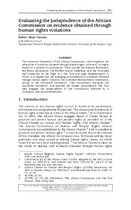| dc.contributor.author | Nanima, Robert | |
| dc.date.accessioned | 2021-06-18T10:55:05Z | |
| dc.date.available | 2021-06-18T10:55:05Z | |
| dc.date.issued | 2020 | |
| dc.identifier.citation | Nanima, R. (2020). Evaluating the jurisprudence of the African Commission on evidence obtained through human rights violations. De Jure,53,307-311 | en_US |
| dc.identifier.issn | 2225-7160 | |
| dc.identifier.uri | 10.17159/2225-7160/2020/v53a20 | |
| dc.identifier.uri | http://hdl.handle.net/10566/6307 | |
| dc.description.abstract | The normative framework of the African Commission, which regulates the
admission of evidence obtained through human rights violations, is largely
based on a number of instruments. These include the Tunisian Resolution,
the Dakar Declaration, the Robben Island Guidelines and the Principles
and Guidelines on the Right to a Fair Trial and Legal Representation in
Africa. It is argued that the emerging jurisprudence on evidence obtained
through human rights violations has a limited developmental framework,
owing to the normative framework. This contribution discusses the
normative framework, and qualifies the limited jurisprudence. The final
step engages the jurisprudence of the Commission followed by a
conclusion and recommendations. | en_US |
| dc.language.iso | en | en_US |
| dc.publisher | University of Pretoria | en_US |
| dc.subject | African commission | en_US |
| dc.subject | Human rights violations | en_US |
| dc.subject | Tunisian resolution | en_US |
| dc.subject | Robben Island | en_US |
| dc.subject | Fair trail | en_US |
| dc.title | Evaluating the jurisprudence of the African Commission on evidence obtained through human rights violations | en_US |
| dc.type | Article | en_US |

